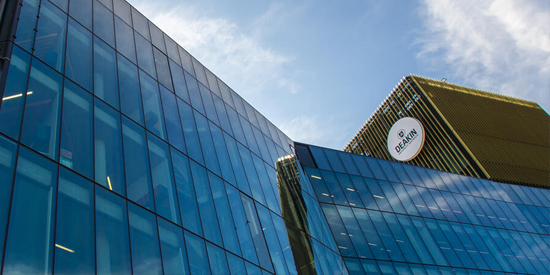New ARC Discovery Projects funding for Deakin
Research news
Deakin University researchers have been awarded more than $2.5 million dollars in Australian Research Council (ARC) Discovery Projects.
Discovery Projects, a flagship scheme for fundamental research and the largest scheme under the ARC National Competitive Grants Program, provides funding of between $30,000 and $500,000 each year for up to five consecutive years.
The funding can be used to support research assistants and technicians, access to research and infrastructure facilities, technical workshop services, essential field research, equipment and consumables, and the publication and dissemination of findings.
Deakin’s successful projects focus on education, the environment and social sciences, from translating climate change research into a 21st century curriculum to understanding the effects of religion and spirituality on cultures.
Deakin’s Deputy Vice-Chancellor Research, Alfred Deakin Professor Julie Owens, says the Discovery Projects scheme supports individual researchers or research teams to discover and innovate, and build new expertise essential for a knowledge-based society and economy.
‘These projects build on Deakin’s strengths in a number of areas we have recently been recognised for globally, including ranking among the world's top 5 for education and education research and our researchers being named among the best in Australia, in these and other fields,’ Prof. Owens says.
The projects include:
Feedback literacy for effective learning at university and beyond
Led by Professor Phillip Dawson, Associate Director of Deakin’s Centre for Research in Assessment and Digital Learning (CRADLE), the project aims to develop frameworks and strategies to help learners make the most of feedback across their studies and into their working lives. Using behaviour change techniques from the health and social sciences, the researchers expect to develop ways to support students and graduates to seek out and use feedback, and to manage their emotions throughout the feedback process. Outcomes will include evidence-informed strategies that individuals and institutions can use to develop life-long capabilities to make the most of feedback, providing benefits in sectors where productivity, learning and wellbeing depend on healthy and effective engagement with feedback.
The research team includes CRADLE’s Director Alfred Deakin Professor David Boud, who was named among the world’s most highly cited researchers for 2022; Professor Elizabeth Molloy; Associate Professor Jaclyn Broadbent; Dr Joanna Tai; and Professor Naomi Winstone.
Australian spirituality: wellness, wellbeing and risks
Led by Alfred Deakin Institute's, Associate Professor Anna Halafoff, this is the first nationwide study of spirituality in Australia, investigating First Nations, religious, and holistic spirituality, their contributions to wellbeing, and their possible risks. While there has been significant research conducted in Australia on rising religious diversity and those who are non-religious, spirituality has not received the same scholarly attention despite its popularity. Drawing on the expertise of leading First Nations, Australian and international scholars, the project includes a national survey and interviews with spiritual persons, and case studies of sacred places around the country.
The research team includes Professor Cristina Rocha; Professor Andrew Singleton; Dr Tyson Yunkaporta; Professor Lori Beaman; Professor Paul Bramadat; and Associate Professor Mar Griera.
Evaluating innovative assurance practices for sustainability reporting
While modern companies and organisations are accountable for and report on a broad range of social and environmental issues, this enhanced reporting must be credible to be relied upon. Led by Deakin Business and Law’s Professor Roger Simnett, this project is expected to make significant contributions in identifying and evaluating best practice credibility-enhancing techniques and informing policy and standard-setting options in Australia and overseas. The benefits include higher quality and more reliable disclosures resulting in better resource allocation decisions and informed policy determinations.
The project team includes Dr Shan Zhou.
Enacting climate change education through representing scientists’ practice
Led by Alfred Deakin Professor Russell Tytler, Chair in Science Education, the researchers will work with scientists and teachers across three continents to translate contemporary climate-related research practices into a curriculum approach that emphasises deep science knowledge, skills, and values. It responds to a pressing national need to prepare students for a 21st century marked by fast changing work futures and the need for decision making and action regarding environmental challenges. The research will contribute to an enhanced scientific workforce and develops citizens capable of responding to complex environment-related challenges.
The research team includes Dr Peta White; Professor Ying-Shao Hsu; and Professor Maija Aksela.
Preventing water theft in the Murray-Darling Basin
This project, led by ADI’s Professor Reece Walters, aims to understand the complex interaction of socio-economic, legal and political factors that have enabled the theft of fresh water in the Murray-Darling Basin. By analysing the policies and regulations governing freshwater management, the researchers hope to generate new knowledge of the extent and types of water theft, offenders processed, penalties delivered, and the performance and operations of regulatory and enforcement agencies. The expected outcomes include new research strategies for water theft prevention that will benefit national security and community health by contributing to a sustainable and equitable supply of fresh water.
The research team includes Dr Laura Bedford; Dr Tariro Mutongwizo; and Adjunct Professor Robert White.
Civilisationist mobilisation, digital technologies and social cohesion
Civilisational populist rulers polarise societies mainly along religious lines. They also interfere with their emigrants, mobilising supporters against other expatriates. This project, led by ADI’s Professor Ihsan Yilmaz aims to advance knowledge of authoritarian states' transnational influence on social cohesion and inter-group conflict. By studying Islamist and Hindutva civilisationist mobilisations, their reach into their emigrants via digital technologies, and their impact on Turkish and Indian groups in Australia, the researchers aim to assist policy makers and community groups to deal with this phenomenon's negative effects and develop intervention strategies.
The research team includes Dr Priya Chacko and Dr Ana-Maria Bliuc.
Share this story

Key Fact
Deakin University researchers have been awarded more than $2.5 million dollars in Australian Research Council (ARC) Discovery Projects.
